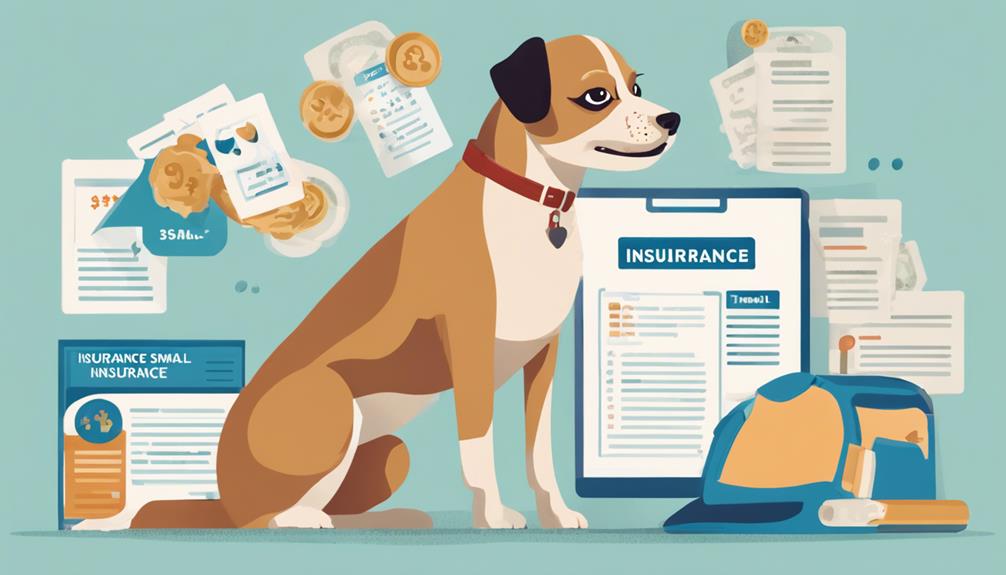Top 13 Tips for Choosing Small Dog Pet Insurance
When choosing small dog pet insurance, make sure to review coverage limits and customize options to suit your needs. Compare premium costs and benefits, focusing on affordability. Don't forget pre-existing conditions and note any limitations. Understand deductibles and co-pays for financial planning. Research the reputation of insurance providers for reliability. Check for coverage of routine care and preventive treatments. Look into claims processes and customer service satisfaction. Consider your dog's age, breed, and health factors. Explore policy features like add-ons and behavioral therapy options. Inquire about waiting periods and renewal policies. These tips will help you make a well-informed decision for your furry companion.
Coverage Limits and Exclusions
When selecting small dog pet insurance, it's crucial to carefully review the coverage limits and exclusions to ensure you understand what's included and what isn't covered. Understanding the coverage details and limitations of your policy is essential to make an informed decision. Most pet insurance policies have specific exclusions, such as pre-existing conditions, elective procedures, and certain breeds' hereditary conditions. By examining these exclusions, you can avoid any surprises when filing a claim.
Policy customization options allow you to tailor your coverage to suit your small dog's specific needs. Some insurers offer add-ons for routine care, dental coverage, or alternative therapies. These customization options enable you to personalize your policy to provide comprehensive coverage for your furry friend.
It is important to pay attention to the coverage limits set by the insurance provider. These limits determine the maximum amount the insurer will pay for covered services. Be aware of any sub-limits within the policy, such as annual or lifetime caps, as they can impact your reimbursement amounts. Understanding these limits will help you manage your out-of-pocket expenses effectively.
Cost of Premiums
To evaluate the overall value of small dog pet insurance, it's essential to consider the cost of premiums and how they align with the coverage provided. Premium affordability plays a crucial role in selecting the right insurance plan for your furry companion. When exploring different insurance options, comparing benefits alongside premium costs can help you make an informed decision.
Premium affordability is a key factor to weigh when choosing small dog pet insurance. While it may be tempting to opt for the cheapest premium available, it's important to ensure that the coverage provided meets your pet's needs. Some insurance plans with lower premiums may have higher deductibles or limited coverage, so carefully review the policy details to understand what's included and excluded.
Comparing benefits across different insurance plans is essential to determine the value you're receiving for the premiums you pay. Look for coverage that includes routine care, accidents, illnesses, and potential hereditary conditions specific to small dog breeds. Consider whether the plan covers preventive care, prescription medications, and emergency services, as these can significantly impact your overall costs in the long run.
Pre-existing Conditions
Considering your small dog's pre-existing conditions, it's crucial to understand how they may impact your pet insurance coverage. Pre-existing conditions refer to any health issues or illnesses that your dog had before getting insurance coverage. Here are some key points to keep in mind regarding pre-existing conditions:
- Treatment Options: When your small dog has pre-existing conditions, it's essential to check if the insurance policy covers the treatment options for those specific conditions. Some policies may exclude coverage for pre-existing conditions or have limitations on the treatments covered.
- Affordability: Pre-existing conditions can affect the cost of insurance premiums. Insurance providers may charge higher premiums or exclude coverage for those conditions altogether. Consider whether the additional cost fits into your budget and if the coverage justifies the price.
- Long Term Care: For pre-existing conditions requiring long-term care, ensure the insurance policy provides adequate coverage. Review the policy details to understand how long-term care for pre-existing conditions is handled and if there are any limitations on coverage.
- Financial Planning: Having a small dog with pre-existing conditions requires careful financial planning. Evaluate the potential expenses for managing those conditions and choose a pet insurance plan that aligns with your financial goals and provides the necessary coverage for your furry companion.
Deductibles and Co-pays
Understanding the implications of deductibles and co-pays is essential when selecting small dog pet insurance. Deductibles are the amount you must pay out of pocket before your insurance starts covering costs. Co-pays, on the other hand, are the fixed amounts you must contribute towards each veterinary visit or treatment. When evaluating insurance options for your small dog, consider how deductibles and co-pays affect your overall expenses.
When it comes to deductibles, lower amounts mean higher monthly premiums, while higher deductibles usually result in lower premiums. Analyze your financial situation and the health needs of your small dog to determine the deductible amount that strikes the right balance for you. Additionally, look into the claim processing times of different insurance providers. Quick and efficient claim processing can make a significant difference in your reimbursement rates.
Policy customization and coverage options are also crucial factors to consider. Some insurance plans may offer higher deductibles but lower co-pays, or vice versa. Evaluate the coverage options to ensure they align with your small dog's specific needs. Remember, the goal is to find a policy that not only fits your budget but also provides adequate coverage for potential health issues.
Reputation of the Insurance Provider
When evaluating small dog pet insurance options, assessing the reputation of the insurance provider is crucial for ensuring quality coverage and reliable service. Here are four key factors to consider when evaluating the reputation of an insurance provider:
- Provider Reliability: Look for insurance companies that have a history of prompt claim processing and efficient customer service. A reliable provider will ensure that your claims are handled quickly and fairly, giving you peace of mind during stressful times.
- Customer Satisfaction: Research customer reviews and ratings to gauge the overall satisfaction of policyholders. Positive feedback regarding the ease of filing claims, helpfulness of customer service representatives, and overall experience can indicate a reputable insurance provider.
- Industry Reputation: Consider the insurance company's standing within the pet insurance industry. Reputable providers are often recognized by industry experts and organizations for their commitment to quality coverage and customer service.
- Financial Stability: Evaluate the financial stability of the insurance provider. A financially secure company is more likely to meet its obligations, ensuring that your pet's medical expenses are covered when needed.
Wellness and Preventative Care Coverage
To ensure comprehensive coverage for your small dog, it's essential to assess the inclusion of wellness and preventative care in your pet insurance policy. When selecting a pet insurance plan, consider the preventative care benefits offered. These benefits often cover routine services such as vaccinations, flea and tick prevention, heartworm medication, and annual check-ups. Opting for a policy that includes preventative care can help you stay ahead of potential health issues and keep your furry companion in optimal health.
Wellness program options are another crucial aspect to evaluate when choosing small dog pet insurance. Some insurance providers offer wellness programs that can be added to your policy for an additional fee. These programs typically cover expenses related to routine care, dental cleanings, spaying or neutering, and even behavioral training. By enrolling in a wellness program, you can ensure that your small dog receives the necessary preventive treatments and services without worrying about the financial burden.
Before finalizing your decision, carefully review the preventative care benefits and wellness program options provided by different insurance companies. Selecting a policy that includes comprehensive coverage for routine care and preventive measures can help you save on veterinary expenses and ensure that your small dog receives the necessary care to lead a healthy and happy life.
Claims Process and Customer Service

For a seamless experience with your small dog pet insurance, streamline your understanding of the claims process and the quality of customer service provided. When choosing pet insurance, the claims process and customer service are crucial aspects to consider to ensure you have a positive experience when your furry friend needs care.
Here are four essential tips to help you navigate the claims process and assess customer service quality:
- Clear Claims Process: Look for insurance providers that offer a straightforward and transparent claims process. Ensure that the steps to file a claim, documentation requirements, and reimbursement timelines are clearly outlined in the policy.
- Responsive Customer Service: Opt for a pet insurance company known for its prompt and helpful customer service. Check reviews or seek recommendations to gauge the level of customer satisfaction with the insurer's responsiveness to queries and concerns.
- 24/7 Support: Consider insurers that provide round-the-clock customer support. Emergencies can happen at any time, so having access to assistance whenever you need it can bring peace of mind.
- Claim Approval Rate: Research the insurer's claim approval rate to understand how likely claims are to be accepted. A high approval rate indicates a smoother claims process and better customer satisfaction.
Age and Breed Restrictions
Understanding age and breed restrictions is crucial when selecting small dog pet insurance to ensure the coverage aligns with your pet's specific requirements and limitations. Insurance providers often have age restrictions for enrollment, with some policies only accepting dogs below a certain age to minimize the risk of pre-existing conditions. Additionally, certain breeds may have predispositions to specific health issues due to genetic factors, leading insurance companies to impose breed restrictions or offer coverage with adjusted terms.
When considering small dog pet insurance, it's essential to review the age limitations set by the insurer. Some policies may have an age cap for enrollment, while others might restrict coverage for senior dogs or impose higher premiums for older pets. Understanding these age restrictions will help you choose a policy that provides adequate coverage for your small dog at different life stages.
Breed restrictions are also common in pet insurance policies due to the varying health risks associated with different breeds. Providers may exclude coverage for specific health conditions related to certain breeds or charge higher premiums based on breed-related health history. By researching breed-specific health concerns and the corresponding insurance limitations, you can select a policy that addresses your small dog's potential health needs while considering genetic factors that may impact their well-being.
Maximum Payouts

When exploring small dog pet insurance, it's important to consider the maximum payouts offered by different policies to understand the financial limits of coverage for your pet's medical expenses.
Here are some key points to keep in mind regarding maximum payouts:
- Claim Denial Reasons: Familiarize yourself with the common reasons insurance claims might be denied. Ensure you understand these reasons to prevent claim denials and maximize your coverage.
- Reimbursement Process: Understand how the reimbursement process works. Know what documents are required, how long it takes to process a claim, and the method of reimbursement (e.g., direct deposit or check).
- Emergency Vet Visits: Check if emergency vet visits are covered, especially after hours when regular veterinary clinics may be closed. Knowing the extent of coverage for emergency situations is crucial for your pet's well-being.
- After Hours Care: Inquire about coverage for after-hours care, which is often necessary in emergencies. Understand the financial limits for these services to ensure your pet receives the care it needs without incurring unexpected expenses.
Being informed about the maximum payouts of your small dog pet insurance policy can help you make the best decision for your furry friend's health and your financial peace of mind.
Add-on Coverage Options
Consider exploring additional coverage options to enhance your small dog pet insurance policy and provide comprehensive protection for your furry companion. Opting for add-on coverage can offer you additional benefits and customization, allowing you to tailor the policy to better suit your needs and your small dog's specific requirements. These optional extras can provide you with peace of mind, knowing that your pet is well-covered in various situations that may arise.
One popular add-on coverage option is wellness coverage, which typically includes routine care such as vaccinations, flea and tick prevention, annual check-ups, and more. This can be beneficial for maintaining your small dog's overall health and catching any potential issues early on.
Another valuable add-on to consider is coverage for hereditary conditions or breed-specific illnesses. Small dog breeds are often prone to certain health issues, and having coverage for these can help offset the costs of treatment and care associated with these conditions.
Additionally, you may want to explore coverage for behavioral therapy or alternative treatments like acupuncture or hydrotherapy. These options can be beneficial if your small dog requires specialized care beyond traditional medical treatments.
Waiting Periods

Waiting periods in small dog pet insurance policies typically require a specific timeframe to pass before certain coverage benefits become effective. Understanding waiting periods is crucial when selecting a policy that suits your needs. Here are some essential points to consider:
- Policy Flexibility: Some pet insurance providers offer flexible waiting periods, allowing you to choose a waiting period that aligns with your preferences and budget. Opting for a shorter waiting period may mean higher premiums, but it ensures coverage kicks in sooner.
- Waiting Period Exceptions: While most insurance policies have waiting periods for standard coverage, there are often exceptions for certain situations. For example, injuries resulting from accidents may have a shorter waiting period or even immediate coverage. Be sure to inquire about any waiting period exceptions to maximize your coverage.
- Coverage Activation: It's important to note that waiting periods vary depending on the type of coverage. While some benefits may have a short waiting period, others, such as those related to pre-existing conditions, may have extended waiting periods or exclusions.
- Policy Renewal: Waiting periods typically apply when you first enroll in a policy or add a new coverage option. However, they may also come into play during policy renewals if you make changes or upgrades to your plan. Be mindful of how waiting periods can impact your coverage over time.
Understanding waiting periods and their implications can help you make an informed decision when choosing small dog pet insurance.
Renewal Policy Details
Understanding how renewal policy details impact your small dog pet insurance coverage is key to ensuring continuous protection for your furry companion. When evaluating pet insurance options, it's essential to carefully review the renewal process and any potential policy updates that may occur.
Before signing up for a policy, make sure to inquire about how the renewal process works. Some insurance providers automatically renew policies, while others may require you to manually renew each year. Understanding this process will help you avoid any lapses in coverage for your small dog.
Additionally, it's crucial to stay informed about any policy updates that may occur at the time of renewal. Insurance companies may make changes to coverage limits, premiums, deductibles, or exclusions, which could impact your small dog's protection. By being aware of these potential updates, you can assess whether the policy still meets your needs and make adjustments if necessary.
To ensure continuous coverage for your small dog, stay proactive in monitoring the renewal process and any policy updates that may arise. Regularly reviewing your policy and communicating with your insurance provider can help you make informed decisions to safeguard your furry friend's health and well-being.
Online Reviews and Recommendations

When researching small dog pet insurance options, exploring online reviews and recommendations can provide valuable insights into the quality and reliability of different insurance providers. Here are some tips to help you navigate online reviews effectively:
- Comparison Websites: Utilize comparison websites that specialize in pet insurance to gather information on different providers. These platforms often offer side-by-side comparisons of coverage, pricing, and customer satisfaction ratings.
- Social Media Influencers: Look for recommendations from trusted social media influencers who've experience with small dog pet insurance. Influencers often share honest reviews and insights that can help you make an informed decision.
- Diverse Sources: Don't rely solely on one source for reviews. Explore multiple platforms, such as Google Reviews, Trustpilot, or consumer advocacy websites, to get a comprehensive understanding of the insurance provider's reputation.
- Specific Feedback: Pay attention to reviews that mention experiences related to small dog coverage specifically. This targeted feedback can give you a clearer picture of how well a provider caters to the needs of small dog owners.
Frequently Asked Questions
Can I Customize My Pet Insurance Plan With Specific Coverage Options?
Yes, you can customize your pet insurance plan with specific coverage options to cater to your small dog's needs. This flexibility allows you to tailor the policy to address your pet's specific requirements while considering your budget.
By selecting coverage that aligns with your small dog's unique needs, you can ensure they receive the necessary care without overspending on unnecessary services.
It's important to review the coverage options carefully to find the best fit for your furry friend.
Are There Any Discounts Available for Insuring Multiple Small Dogs?
Yes, most pet insurance providers offer discounts for insuring multiple small dogs. These multiple pet discounts can help you save money while ensuring all your furry friends are covered.
Additionally, coverage customization options are typically available, allowing you to tailor your plan to meet the specific needs of each of your pets. By taking advantage of these options, you can create a comprehensive and cost-effective insurance plan for your small dogs.
How Does the Insurance Handle Coverage for Hereditary Conditions?
When considering hereditary conditions in your small dog's insurance, it's crucial to understand the coverage limitations and breed exclusions.
Some policies may have restrictions on pre-existing conditions, or certain hereditary illnesses may not be covered. It's essential to carefully review the policy details to ensure your furry friend is adequately protected.
Make sure to inquire about specific coverage for breed-related health issues to make an informed decision on your pet insurance.
Is There a Limit on the Number of Claims I Can Make per Year?
Yes, there may be a limit on the number of claims you can make per year with pet insurance. Claim frequency restrictions vary between insurance providers, so it's essential to review the policy details carefully.
Some policies may have a maximum number of claims allowed annually, while others may have no such limitation. Understanding any coverage limitations related to claim frequency can help you make an informed decision when selecting the right insurance for your small dog.
Do I Need to Provide Medical Records for My Small Dog When Applying for Insurance?
When applying for insurance for your small dog, you'll likely need to provide medical records. These records help insurance providers assess your pet's health, identify any pre-existing conditions, and determine the level of coverage needed.
Some policies may require specific documentation, especially for breed-specific coverage or to exclude certain conditions. Ensuring you have all necessary medical records ready can streamline the application process and help you get the right coverage for your furry friend.
Conclusion
In conclusion, choosing the right small dog pet insurance involves careful consideration of coverage limits, costs, pre-existing conditions, deductibles, and the reputation of the provider.
It's important to review add-on coverage options, waiting periods, renewal policies, and online reviews before making a decision.
By taking the time to thoroughly research and compare different insurance options, you can ensure that your furry companion is protected in case of unexpected health issues.
Make an informed choice to give your small dog the best care possible.
